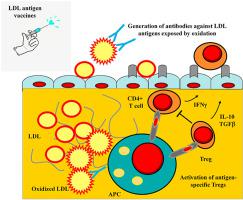Atherosclerosis ( IF 4.9 ) Pub Date : 2021-08-25 , DOI: 10.1016/j.atherosclerosis.2021.08.033 Jan Nilsson 1 , Prediman K Shah 2

|
Immune responses activated by LDL particles that have been trapped and oxidized in the arterial wall play an important role in atherosclerosis. Some of these immune responses are protective by facilitating the removal of pro-inflammatory and toxic lipid species formed as result of LDL oxidation. However, should these protective immune responses be insufficient other more potent pro-inflammatory immune responses instead contributing to disease progression will gradually become dominant. The importance of the balance between protective and pathogenic immunity is particularly apparent when it comes to the adaptive immune system where pro-inflammatory T helper 1 (Th1) type T cells aggravate atherosclerosis, while regulatory T cells (Tregs) have an opposing role. As oxidized LDL is a key autoantigen in atherosclerosis it has become an interesting possibility that immune-modulatory therapy that favors the activity of apolipoprotein B peptide-specific Tregs could be developed into a novel treatment strategy for prevention/stabilization of atherosclerosis and ischemic cardiovascular events. Indeed, several such oxidized LDL tolerance vaccines have shown promising results in animal models of atherosclerosis. This review will discuss the experimental background for development of atherosclerosis vaccines based on LDL-derived antigens as well as the challenges involved in translating these findings into clinical application.
中文翻译:

通过接种低密度脂蛋白衍生抗原促进动脉粥样硬化免疫
由被困在动脉壁中并被氧化的 LDL 颗粒激活的免疫反应在动脉粥样硬化中起重要作用。这些免疫反应中的一些通过促进去除由于 LDL 氧化而形成的促炎和有毒脂质种类而具有保护作用。然而,如果这些保护性免疫反应不足,其他更有效的促炎免疫反应反而会促进疾病进展,将逐渐成为主导。在适应性免疫系统中,保护性免疫和致病性免疫之间平衡的重要性尤为明显,其中促炎性 T 辅助 1 (Th1) 型 T 细胞会加重动脉粥样硬化,而调节性 T 细胞 (Treg) 则具有相反的作用。由于氧化的 LDL 是动脉粥样硬化的关键自身抗原,因此有利于载脂蛋白 B 肽特异性 Treg 活性的免疫调节疗法可以发展成为预防/稳定动脉粥样硬化和缺血性心血管事件的新治疗策略,这已成为一种有趣的可能性。事实上,几种这样的氧化低密度脂蛋白耐受疫苗在动脉粥样硬化的动物模型中显示出有希望的结果。本综述将讨论基于 LDL 衍生抗原开发动脉粥样硬化疫苗的实验背景,以及将这些发现转化为临床应用所涉及的挑战。











































 京公网安备 11010802027423号
京公网安备 11010802027423号